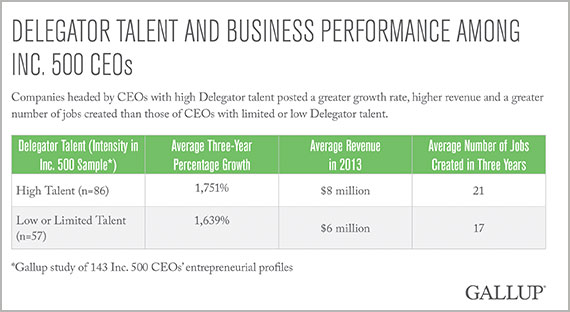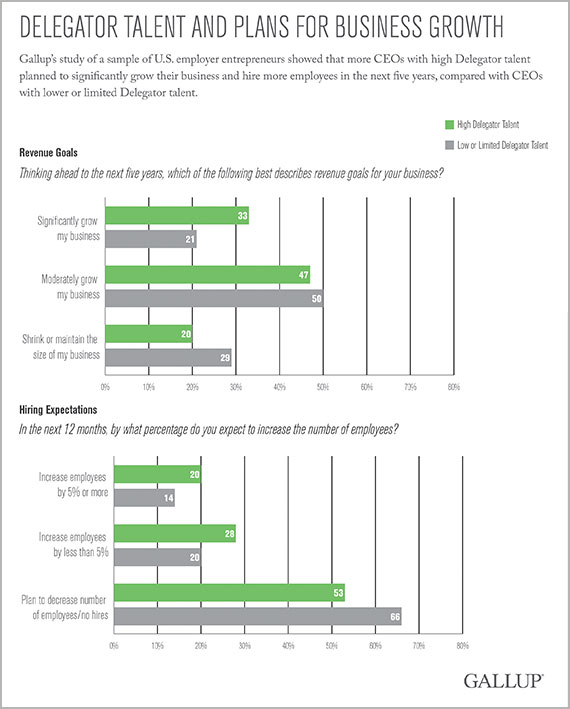Story Highlights
- Management problems start as the business expands
- Delegating effectively is a key trait of great entrepreneurs
- Delegation frees up the business founder's time and talents
Entrepreneurs who have the natural ability to build teams and manage people are rare. Only one in four employer entrepreneurs -- business leaders who are founders of a company with at least one employee -- have high levels of Delegator talent. Delegation is essential to a business' success, especially as it grows beyond the startup phase.
Most traditional definitions of entrepreneurship focus on starting up as the initial metric of success. So the absence of high delegation talents among the average entrepreneur is understandable, though hardly ideal. Gallup research shows that founders who have and use high Delegator talent can generate better business growth and venture success than leaders who get lost in the day-to-day minutiae of managing a business.
Moving Beyond the Startup Phase
It's easy to picture the founder of a thriving business as a natural Risk-Taker, someone fueled by unbridled Determination and someone who is fiercely independent, with full autonomy and control over all aspects of her business. Many entrepreneurs single-handedly take an idea from concept to creation by recognizing opportunities, gathering resources, building networks, setting goals and implementing strategies, among other crucial activities. This jack-of-all-trades mindset, along with prevalence of other talents that drive entrepreneurial success, factors heavily into the odds of survival for initial startups.
Inevitably, though, founders must grapple with a management challenge as their business expands: A rapidly growing venture requires skill sets beyond the entrepreneur's. Suddenly, the founder must hire the right talent, build a team and manage those employees. Maybe the entrepreneur started her business because she saw a product-market fit or discovered a way to innovate in an existing market. With the business' success, however, the entrepreneur must effectively work on the business, rather than intensely in it. Failure to do so could jeopardize the venture's success.
Delegation Is Key to Business Growth and Expansion
In 2014, Gallup studied the entrepreneurial talent profiles of 143 CEOs included on the Inc. 500 list, an annual ranking of America's fastest-growing private companies. Collectively, the 2014 Inc. 500 CEOs experienced a median growth rate of 1,828%, while creating more than 46,000 jobs.
What's intriguing, though, is the difference in business performance between Inc. 500 CEOs with high Delegator talent versus those with less of this talent. Of the 143 Inc. 500 CEOs Gallup surveyed, those with high Delegator talent posted an average three-year growth rate of 1,751% -- 112 percentage points greater than those CEOs with limited or low Delegator talent.
CEOs with high Delegator talent also generated 33% greater revenue in 2013 than those with low or limited levels of the talent: $8 million versus $6 million, respectively. Greater growth and higher revenues also enabled these entrepreneurs to create more jobs at a faster rate. Companies led by those with high Delegator talent, on average, created 21 jobs in three years, compared with 17 new jobs in three years for those with lower levels of Delegator talent.

The business benefits of delegation aren't exclusive to the Inc. 500 executives in Gallup's study. When Gallup studied 1,446 employer entrepreneurs in the U.S. in 2014, 33% of those with high Delegator talent said they planned to significantly grow their business, compared with 21% of entrepreneurs with lower or limited Delegator talent who said the same. And 20% of employer entrepreneurs with high Delegator talent said they planned to increase their employee base by 5% or more in the next year, compared with 14% of entrepreneurs with lower or limited Delegator talent.

What Delegators Do Differently
The ability to delegate effectively is a fundamental managerial trait of successful entrepreneurs. Founders who are naturally effective Delegators are great managers and supportive bosses. Yet 75% of the employer entrepreneurs Gallup studied have limited-to-low levels of Delegator talent, jeopardizing their ability to build teams that can positively influence company performance. These executives struggle with people management, which greatly hampers their company's potential growth.
Gallup identifies six key differences between leaders with high Delegator talent and those with lower or limited Delegator talent:
- Delegators know that they can't accomplish everything themselves. They are willing to relinquish control and hand tasks to others. This frees up their time to focus on activities that can yield the highest returns for the company. Non-Delegators -- those with low or limited Delegator talent -- can become so lost in day-to-day activities that they rarely have enough time to focus on actions vital to their company's growth.
- Delegators develop team capacity using a strengths-based approach. They take the time to understand what their people naturally do best, and then position them to take on tasks at which they are most likely to excel. This motivates and engages employees, increases productivity and benefits the entire business. Non-Delegators often don't understand their employees' strengths and capabilities, which leads them to push the proverbial square pegs into round holes.
- Delegators ensure that employees have everything they need to do their jobs. They provide employees tools, resources, training and learning opportunities; they genuinely care about each employee's growth. Non-Delegators are impatient and unable to give employees everything they need to accomplish the tasks to which they are assigned.
- Delegators focus on outcomes, not processes. They set clear expectations about everything from timing to budget to deliverables, and they monitor progress, affecting employee commitment, boosting morale and influencing company performance. Non-Delegators micromanage and fail to set clear expectations, leaving employees confused and frustrated in their work.
- Delegators encourage new ideas and approaches to accomplishing goals. They foster psychological ownership and engagement among employees by giving them autonomy to achieve their goals. Non-Delegators do not trust others to do things as well as they themselves can. They hinder growth by centralizing and controlling decision-making at every turn.
- Delegators communicate frequently with employees. They provide feedback about what works and what doesn't, and they recognize employees for a job well done, all fostering an atmosphere of mutual trust and respect. Non-Delegators don't provide constructive feedback, but rather they are quick to assign blame. This can demoralize employees and create a dysfunctional environment that hampers productivity and growth.
Business success and growth aren't exclusive to entrepreneurs who are highly talented at delegating. Founders with less Delegator talent can flourish by being self-aware and by surrounding themselves with partners who have talents they lack. Entrepreneurs who develop their Delegator talent can experience a boost in company performance. Delegating effectively frees up a talented founder to do what she does best in other areas of the business, which can help ensure her business' future growth.
Survey Methods
This study is based on employer businesses from the nationally representative sample of entrepreneurs, drawn from Gallup Panel members, aged 18 years and older, living in all 50 U.S. states and the District of Columbia. The Gallup Panel is a probability-based, longitudinal panel of 60,000 U.S. adults who are selected using random-digit-dial (RDD) and address-based sampling methods. Panel members can be surveyed by phone, mail or Web. Gallup Panel members with access to the Internet were invited to take the Entrepreneurial Profile 10 online. Web surveys were conducted March 31-April 21, 2014, with a random sample of approximately 14,128 respondents, which included 2,697 business owners. There were 1,446 employer businesses in this sample. Interviews are conducted with respondents via the Web in English only. Samples are weighted to correct for unequal selection probability and nonresponse. The data are weighted to match national demographics of age, gender, education, race, ethnicity, region and business ownership. Business ownership weighting targets are based on the most recent U.S. Census figures for the aged 18 and older self-employed population. For results based on the total sample of employer entrepreneurs, the margin of sampling error is ± 3.6 percentage points at the 95% confidence interval.
Learn more about how the Gallup Panel works.
